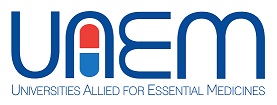Universities Allied for Essential Medicines
This article has multiple issues. Please help improve it or discuss these issues on the talk page. (Learn how and when to remove these messages)
|
 | |
| Founded | 2001 |
|---|---|
| Location | |
Key people | Justin Mendoza, Executive Director, UAEM North America Anna Peiris, Executive Director, UAEM Europe |
| Website | www |
Universities Allied for Essential Medicines (UAEM) is a student-led organization working to improve access to and affordability of medicines around the world, and to increase research and development of drugs for neglected tropical diseases.
Supported by a board of directors and guided by an advisory board that includes Partners in Health co-founder Paul Farmer and Nobel Laureate Sir John Sulston, UAEM has mobilized hundreds of students on more than 100 campuses in more than 20 countries.[1] These student advocates have convinced universities worldwide to adopt equitable global access licensing policies for licensing their medical research, in order to make life-saving health innovations affordable and accessible in low and middle income countries.
Publications
[edit]UAEM has published two student-led research projects. The "University Report Card", which ranks universities on their contributions to global health, received coverage in The New York Times.[2] Reports were released for universities in Canada, the United Kingdom, and the United States.[3]
"Re:Route" maps of biomedical research and development (R&D) alternatives.[4]
Campaigns
[edit]The organization has worked globally on a campaign aimed at encouraging the World Health Organization to discuss an R&D agreement. In 2019, it began a two-year campaign targeting agencies providing public funding for biomedical research around the world under the name "Take Back Our Medicines" (TBOM).[5]
In March 2020, UAEM launched the "Free the Vaccine for COVID-19" campaign in conjunction with the Center for Artistic Activism, with the primary goal to ensure that publicly-funded COVID-19 tests, treatments and vaccines would be sustainably priced, available to all and free at the point of delivery. [6][7]
Chapters
[edit]The basic units of the organizations are called chapters. A chapter is a self-organised group of students, primarily based at an academic institution often with faculty support. Chapters range in size, from more intimate groups of 2 or 3, to larger gatherings of around 30 or more students.[8] UAEM chapters are present in the US, United Kingdom, Canada, Australia, Iran, India, Brazil, Sudan, Austria, Switzerland, Germany, Denmark and The Netherlands.
See also
[edit]- Essential medicines
- Médecins Sans Frontières's Campaign for Access to Essential Medicines
- Patent
- Technology transfer
References
[edit]- ^ "University patents limit access to medicine. These students want to change that". The Washington Post.
- ^ McNeil Jr., Donald G. (2015-05-11). "University Grades Are Mixed on Research for the Poor". The New York Times. ISSN 0362-4331. Retrieved 2022-07-18.
- ^ "Global Health Grades". Universities Allied for Essential Medicines. Retrieved 22 August 2025.
- ^ "UAEM's Re:Route – New Mapping Tool For Alternative Health R&D Models". 25 February 2016.
- ^ "Take Back Our Meds Campaign!".
- ^ "Free the Vaccine Campaign".
- ^ Pai, Madhukar. "Can We Reimagine Global Health In The Post-Pandemic World?". Forbes. Retrieved 2020-04-09.
- ^ "Chapters Archive". Universities Allied for Essential Medicines.